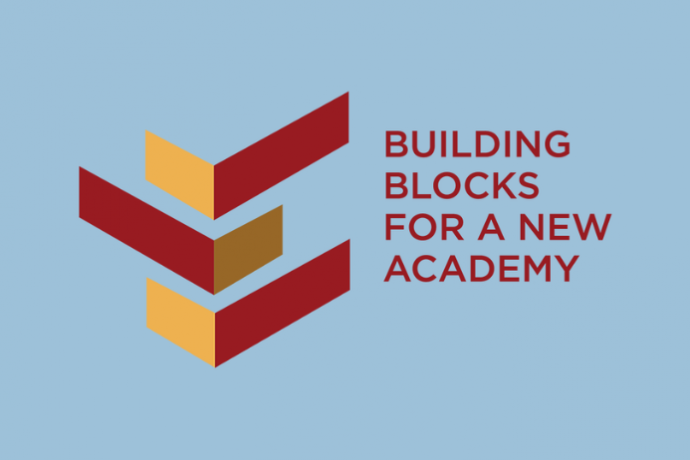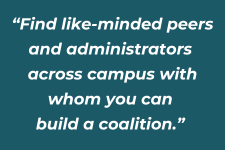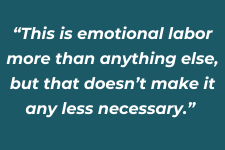Ask LINA: Fall 2023

October 2023
| Dear LINA: I’m a relatively new department chair at an R1. Our undergraduate enrollment has been dropping steadily and our graduate students have been struggling to get through their programs in a timely fashion and find gainful employment. We need to address these issues. Although I have strong relationships with my faculty colleagues and administrators, I keep running up against one faculty member –– let’s call him Professor Grump. Professor G hates everything I am trying to do. He says he understands the need to streamline the PhD exam structure (for example), but then derails meetings with impassioned objections rooted in ideas about “scholarly rigor” and “preserving the discipline,” so that nothing ever gets decided. I, too, want our program to be rigorous, but I don’t think that requires three separate exams! Professor G is well-regarded in his field, and graduate students often come to our institution specifically to work with him. Nobody in the department feels that we can afford to alienate him, but we can’t just wait until he retires to make any changes! How do I convince Professor G to be my ally or at the very least stop standing in my way? Signed, A Frustrated Chair |
Dear Frustrated Chair,
I feel your pain! There’s nothing more challenging than a single person who stands in the way of changes that would benefit students and, ultimately, faculty who need students in order to teach.
Undergraduate and graduate education are separate but deeply connected issues, so it makes tactical sense to pick one while keeping the other in mind. Find like-minded peers and administrators across campus with whom you can build a coalition as well as scholars outside your institution who are engaged in the work of rethinking the discipline and its institutional organization.

Consider structuring a meeting about the future of your department in the context of larger discussions in your discipline; this might help provide some counterbalance to Professor G’s authority and an opening for others to speak their mind. For example, has your professional society released guidelines about expanding “what counts” for promotion and tenure? Do you have peers in your discipline who are rethinking departmental organization whom you could invite to speak at your campus (or via Zoom, if resources are scarce)? Can you (or a faculty member) consult organizations that are supporting innovative approaches to undergraduate or graduate education—for example, Imagining America, or Bringing Theory To Practice—and report on what they find?
Remember that while it’s important to establish common values and goals, it’s also necessary to move to action. Change takes time, so as areas of agreement emerge, take concrete steps toward change.
Good luck!
LINA in New York
Dear Frustrated Chair,
Oh, Professor G. So many of us have a Professor G.
I think your observation about what Professor G says versus what he does in meetings is important. He says he understands the need for change –– but then, when actual decisions are about to be made, he balks. That’s an emotional reaction rooted in fear.
If you have not yet done this, you might consider asking Professor G for coffee and inquiring directly about his objections to the proposed changes. You might probe at some of his vague language around scholarly rigor and the preservation of the discipline to see what his actual concerns are. He may very well have good points that should be addressed.

At the same time, however, try to make it clear that changes need to be made. To take your example of streamlining your PhD exam structure, I assume you have data about time to degree and how your current structure is lengthening it. I would make sure you share that data with Professor G and point out the real impact of that extra year or two on students’ lives (especially if those extra years tend to exceed their funding packages).
A frank one-on-one conversation may help forestall (or even just help you anticipate) his objections in meetings. But even more than that, it’s about helping Professor G feel heard and taken seriously. This is emotional labor more than anything else, but that doesn’t make it any less necessary.
And if that doesn’t work, consider forming a smaller committee to come up with an alternative exam structure which can then be presented to the faculty at large for discussion. If you’ve been having the conversation in the abstract, making it more concrete might help. At least you’ll know what he’s really objecting to.
Good luck.
LINA in Oregon

